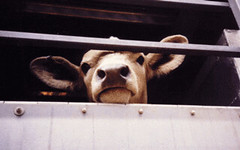As someone concerned with and supportive of non-anthropocentric personhood ethics, I've long insisted that any agent capable of subjective and emotional experience--no matter how subtle or simple--deserves moral consideration. Consequently, even the most "lowly" non-human animals IMO qualify for personhood status of varying degrees; it's been long known that many animals have their own personalities and emotional life. Moreover, most of them are capable of suffering, so as animal rights activist Peter Singer has bravely and cogently argued, we need to look out for their welfare.
Reinforcing this notion, recent studies have shown that farm animals do in fact exhibit human-like qualities in terms of their emotional life and in their relations with other animals. Cows in particular, who are often used as an example to showcase mindless docility in animals, do in fact have a complex internal psychological life in which they bear grudges, nurture friendships and become excited over intellectual challenges. They're also capable of feeling strong emotions such as happiness, pain, fear and even anxiety.
And very importantly, it's now suspected that they are even capable of worrying about the future--a psychological attribute that is often considered a critical threshold in personhood determination (i.e. a person should be capable of making plans and having intentions over time). If cows are worrying about the future, that means that i) they have a sense of self, ii) they are concerned about their welfare (which is intention), and iii) they can imagine themselves in the future (which it can be argued is a type of planning, in that they "plan" or expect themselves to exist in the future). Sounds like a person to me.
Many of these characteristics have been observed in other farm animals, including pigs, goats, and chickens. Consequently, animal rights advocates are urging that animal welfare laws need to be significatnly rethought and reconsidered. Christine Nicol, professor of animal welfare at Bristol University, believes that because remarkable cognitive abilities and cultural innovations have been revealed, "[o]ur challenge is to teach others that every animal we intend to eat or use is a complex individual, and to adjust our farming culture accordingly.” She argues that even chickens should be treated as individuals with needs and problems.
Other observations about farm animal behaviour include:
- cows within a herd form smaller friendship groups of between two and four animals with whom they spend most of their time, often grooming and licking each other
- cows will also dislike other cows and can bear grudges for months or years
- dairy cow herds have a complex and intense sex life
- cows become excited when they solve intellectual challenges; when solving problems, their heartbeats go up and some even hump into the air in excitment
- sheep can remember 50 ovine faces (even in profile) and they can recognise another sheep after as much as a year apart


1 comment:
I have a persistent problem evaluating things like this, and I've never come up with a reasonable solution.
People who advocate for enhanced animal rights are by definition biased in favour of the animals in question. People who don't care or who dislike the animal won't generally do the legwork.
How do we differentiate between legitimate proto-sapience and anthropomorphizing by the researcher who likes fuzzy creatures?
Post a Comment